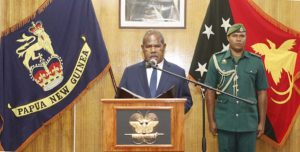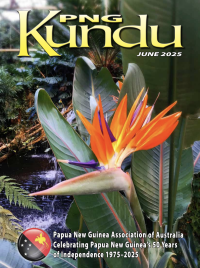Personal Recollections of PNG’s 50th Anniversary
Ian Howie-Willis
I have reason to remember Tuesday, 16 September 1975, Papua New Guinea’s Independence Day. It was one of the most convivial days of my life, mainly spent rejoicing with old friends in Lae.
Independence Day came eight months after I moved to Canberra to begin my PhD research project at the Australian National University (ANU), on the history of the development of the PNG university system. With my wife Margaret’s agreement, I made a spur-of-the-moment decision to return to Lae for the celebrations and to undertake interviews for my thesis in both Lae and Port Moresby. I spent a fortnight between the two cities. In Lae I stayed with my friends Jack and Mary Woodward on the University of Technology (Unitech) campus; and in Port Moresby I stayed with John Haugie, a former student from my time at Brandi High School near Wewak, with whom I had kept in touch.
On the Unitech campus I found that many of the staff from my time, 1968‒1973, were still present. Those still at Unitech included former neighbours Hector and Bori Clark, Neville and Peg Quarry, David and Mary Dale, John and Anne Sandover and Adrian Boddy. Among the Papua New Guineans were Kabi Mande from Finschhafen and Ben from Labu village on the far side of the Markham River mouth. Both Kabi and Ben were Unitech drivers I knew and respected. I had not seen any of these people for two years. I was heartened that all warmly welcomed me back.
Independence Day itself was rather a fizzer for me. It was a public holiday throughout PNG, but to my surprise, no acknowledgement of the occasion was made on the Unitech campus.
A Morobe Province Independence Day ceremony took place on the Lae showground on the Tuesday morning, which I attended with Mary and Jack Woodward. I remember that many thousands of Papua New Guineans had come to town and were milling around in a festive mood. Among them were some of my one-time Pangu Pati comrades who greeted me cheerfully, asking if I had returned for good. I told them in my best Tok Pisin, ‘Unfortunately not. I’ve returned but can’t remain in Lae; but I did want to be with you for your great Independence Day celebration.’
The main National Independence Day event took place at the Sir Hubert Murray Stadium in Port Moresby, where the then Prince Charles represented the Queen. (The British press was vastly amused that in Tok Pisin he was referred to as Pikinini Man Bilong Misis Kwin—‘HM the Queen’s son.’)
As well as speeches, the climax came when the Australian flag was lowered for the last time with the PNG flag raised in its place. The dignitaries present included the Australian Governor General, Sir John Kerr, and Prime Minister, Gough Whitlam (who had not yet fallen out with each other); the new PNG Governor General, Sir John Guise; and the PNG Chief Minister, Michael Somare, who then became the inaugural Prime Minister.
John Guise gave the best speech. He said that independence had come peacefully to PNG and that Australia and PNG would remain close friends. Significantly, he said, the Australian flag had been lowered, not torn down.
On the Tuesday afternoon, Adrian Boddy, Hector Clark, Mary Dale and I conducted our own celebration. Adrian and I had run into one another on the campus and I suggested that we go to the staff club for a celebratory drink. Adrian explained that the club was closed. The government had banned alcohol sales for the six days of official celebrations, 14–19 September lest the rejoicing lead to civil unrest. We happened to be outside Hector’s home on Ramu Drive, so we called in to see if he might have some beer in his fridge. He didn’t but suggested David Dale would have some, despite the official drought.
The three of us trooped across to the Dale estancia, 70 metres away on the far side of Warangoi Avenue. David was playing golf that afternoon but Mary was home. She said that all they had was an open bottle of Mateus Rosé in the fridge which they intended finishing that evening over dinner.
‘That’ll do!’ we said. ‘Will you share it with us now?’ Mary invited us in, fetched four glasses and the bottle and sat us around the dining table. A most congenial afternoon commenced, as we reminisced, joked and laughed over the ‘good old days of yore’, pre-self government and pre-independence.
After we were seated in the Dale dining room, the bottle seemed to empty miraculously. ‘Are you sure that’s all you have, Mary?’ we asked. Mary said that the carton the bottle had come from was in the broom cupboard. There might be other bottles but they would be warm. We went to investigate. Five of the original six bottles were still in the carton.
‘David won’t mind if we borrow one of them!’ we assured her. The second bottle also emptied miraculously, despite its being at room temperature—about 30° C in Lae. About an hour later we were finishing the third bottle when David arrived home. After four glasses each of Mateus, we were merry and expansive. ‘Come and join us, Dave!’ we called out. Dave seemed perturbed by the home invasion, but after a couple of glasses, he was as happy as we were. I don’t know if we ever replaced his case of Mateus, but by the time the party broke up, the sixth bottle was empty, and we were sure we had celebrated Independence Day in the best way possible, affirming special friendships in PNG.
The King’s Medal
The 50th Independence Anniversary King’s Medal is to be awarded, as its name indicates, to mark Papua New Guinea’s significant milestone. The medal program was announced by the Governor-General of Papua New Guinea, Sir Bob Dadae, at Government House on 2 December 2024, who said that Charles III, King of Papua New Guinea, had approved the medal to honour and recognise Papua New Guineans who have made significant contributions to the country over the past 50 years. The King’s medal will be awarded to 3,000 individuals across Papua New Guinea.
The Honours and Awards Committee is chaired by Minister for Foreign Affairs, Justin Tkatchenko, who, under the PM’s department, will oversee the awards, in which all Papua New Guineans were invited to participate. Beginning in June 2025, the Governor-General, as the King’s representative, will undertake medal presentation ceremonies in all the four regions of the country: Lae (Momase), Mount Hagen (Highlands), Kokopo (New Guinea Islands), and the National Capital District (Southern).



